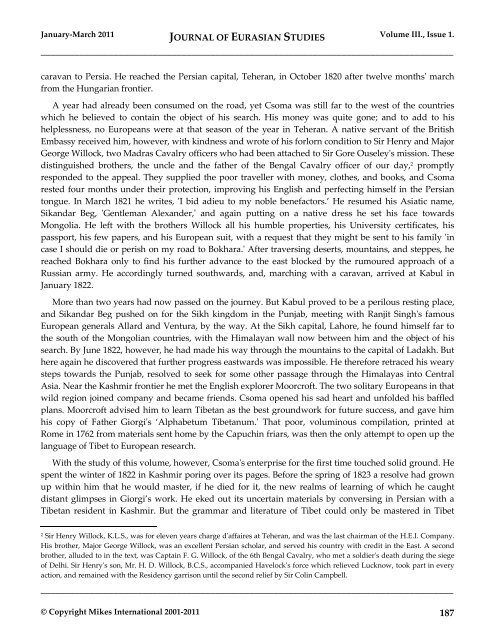JOURNAL OF EURASIAN STUDIES
JOURNAL OF EURASIAN STUDIES
JOURNAL OF EURASIAN STUDIES
You also want an ePaper? Increase the reach of your titles
YUMPU automatically turns print PDFs into web optimized ePapers that Google loves.
January-March 2011 <strong>JOURNAL</strong> <strong>OF</strong> <strong>EURASIAN</strong> <strong>STUDIES</strong> Volume III., Issue 1.<br />
_____________________________________________________________________________________<br />
caravan to Persia. He reached the Persian capital, Teheran, in October 1820 after twelve months' march<br />
from the Hungarian frontier.<br />
A year had already been consumed on the road, yet Csoma was still far to the west of the countries<br />
which he believed to contain the object of his search. His money was quite gone; and to add to his<br />
helplessness, no Europeans were at that season of the year in Teheran. A native servant of the British<br />
Embassy received him, however, with kindness and wrote of his forlorn condition to Sir Henry and Major<br />
George Willock, two Madras Cavalry officers who had been attached to Sir Gore Ouseley's mission. These<br />
distinguished brothers, the uncle and the father of the Bengal Cavalry officer of our day, 2 promptly<br />
responded to the appeal. They supplied the poor traveller with money, clothes, and books, and Csoma<br />
rested four months under their protection, improving his English and perfecting himself in the Persian<br />
tongue. In March 1821 he writes, 'I bid adieu to my noble benefactors.’ He resumed his Asiatic name,<br />
Sikandar Beg, 'Gentleman Alexander,' and again putting on a native dress he set his face towards<br />
Mongolia. He left with the brothers Willock all his humble properties, his University certificates, his<br />
passport, his few papers, and his European suit, with a request that they might be sent to his family 'in<br />
case I should die or perish on my road to Bokhara.' After traversing deserts, mountains, and steppes, he<br />
reached Bokhara only to find his further advance to the east blocked by the rumoured approach of a<br />
Russian army. He accordingly turned southwards, and, marching with a caravan, arrived at Kabul in<br />
January 1822.<br />
More than two years had now passed on the journey. But Kabul proved to be a perilous resting place,<br />
and Sikandar Beg pushed on for the Sikh kingdom in the Punjab, meeting with Ranjit Singh's famous<br />
European generals Allard and Ventura, by the way. At the Sikh capital, Lahore, he found himself far to<br />
the south of the Mongolian countries, with the Himalayan wall now between him and the object of his<br />
search. By June 1822, however, he had made his way through the mountains to the capital of Ladakh. But<br />
here again he discovered that further progress eastwards was impossible. He therefore retraced his weary<br />
steps towards the Punjab, resolved to seek for some other passage through the Himalayas into Central<br />
Asia. Near the Kashmir frontier he met the English explorer Moorcroft. The two solitary Europeans in that<br />
wild region joined company and became friends. Csoma opened his sad heart and unfolded his baffled<br />
plans. Moorcroft advised him to learn Tibetan as the best groundwork for future success, and gave him<br />
his copy of Father Giorgi's ‘Alphabetum Tibetanum.' That poor, voluminous compilation, printed at<br />
Rome in 1762 from materials sent home by the Capuchin friars, was then the only attempt to open up the<br />
language of Tibet to European research.<br />
With the study of this volume, however, Csoma's enterprise for the first time touched solid ground. He<br />
spent the winter of 1822 in Kashmir poring over its pages. Before the spring of 1823 a resolve had grown<br />
up within him that he would master, if he died for it, the new realms of learning of which he caught<br />
distant glimpses in Giorgi’s work. He eked out its uncertain materials by conversing in Persian with a<br />
Tibetan resident in Kashmir. But the grammar and literature of Tibet could only be mastered in Tibet<br />
2 Sir Henry Willock, K.L.S., was for eleven years charge d'affaires at Teheran, and was the last chairman of the H.E.I. Company.<br />
His brother, Major George Willock, was an excellent Persian scholar, and served his country with credit in the East. A second<br />
brother, alluded to in the text, was Captain F. G. Willock, of the 6th Bengal Cavalry, who met a soldier's death during the siege<br />
of Delhi. Sir Henry's son, Mr. H. D. Willock, B.C.S., accompanied Havelock's force which relieved Lucknow, took part in every<br />
action, and remained with the Residency garrison until the second relief by Sir Colin Campbell.<br />
_____________________________________________________________________________________<br />
© Copyright Mikes International 2001-2011 187

















